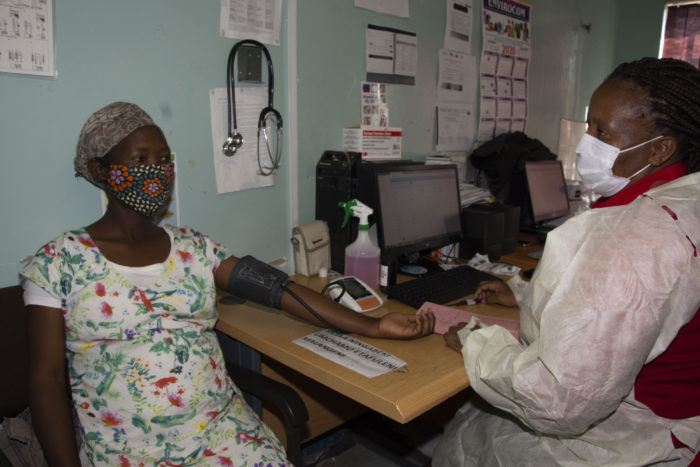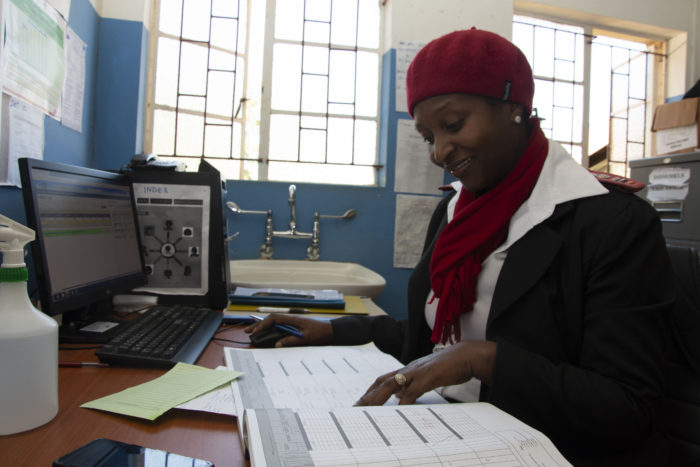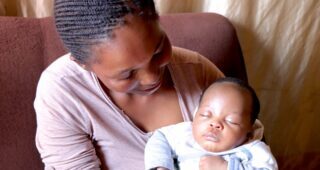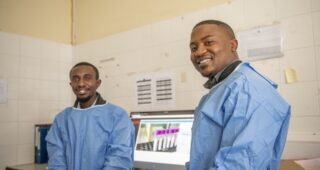Male Support Is Critical for Mothers
 Maphosa Nontobeko is a 32-year-old mother of three—two boys and one girl, ages 5 to 13—living in Maphalaleni, Eswatini. Now expecting her fourth child, Maphosa strongly believes in male support for the elimination of mother to child transmission of HIV.
Maphosa Nontobeko is a 32-year-old mother of three—two boys and one girl, ages 5 to 13—living in Maphalaleni, Eswatini. Now expecting her fourth child, Maphosa strongly believes in male support for the elimination of mother to child transmission of HIV.
“I [first] tested for HIV, when I was pregnant with my [now] five-year-old son,” says Maphosa. That’s when she learned that she is living with HIV.
She says that she was fearful she was going to give birth to an HIV-positive child because she did not believe that antiretroviral therapy could prevent the transmission of HIV from mother to child. However, her supportive husband became her treatment champion throughout the pregnancy, and encouraged her to not lose hope.
“The support I received from him after I became pregnant, including us going together to the facility for an HIV test, made me feel at ease and very supported,” says Maphosa. Because of his support, she adhered to her medication, preventing the virus from being transmitted to her youngest son.
“The encouragement that men provide to their HIV-positive partners can make a big difference when it comes to eliminating mother-to-child transmission of HIV,” says Felicity Maya, a senior nurse at Sigangeni Clinic.
“Males are pillars of their homes and having them lead in coming to the facilities can make us quickly achieve our goal for the elimination of pediatric HIV in our country,” she says, adding that men were able to motivate each other, hence male friendly facilities can also be used as their meeting place for sharing their experiences.
Eswatini faces a nationwide challenge when it comes to men accessing health services. Many men report feeling unsupported by staff in health facilities, leaving some to fail in taking their medication as prescribed.
Sabelo Nkambule, a 41-year-old man from Somnjalose in the Hhohho region, says it is very important to take their health seriously if we want to eliminate the mother to child transmission of HIV.
Nkambule, a night watchman, has been married for seven years now with three children. He has been very supportive to his family in terms of ensuring that they take their health seriously. He said that to him, going to a health facility and knowing your HIV status was one of the positive things he would like to see every man doing.
It is important as a man to provide support to your partner because that will make her comfortable as she takes her medication. We are responsible for our homes and the health of our children. Sabelo Nkambule, husband and father of three
“It is important as a man to provide support to your partner because that will make her comfortable as she takes her medication. We are responsible for our homes and the health of our children as men,” he says.
To encourage men to take up health services, the facilities set aside Tuesdays as Men’s Health Day. On this day men are encouraged to come to accompany their spouses when coming to the facility and priority in service provision is given to couples on the day.
Maya says that male-friendly facilities are vital, not only in for the benefit of men living with HIV, but also for their female partners.
Maphosa and her husband accessed HIV testing at the Mbabane Voluntary Counselling and Testing (VCT), a facility supported by EGPAF/Eswatini with funding from PEPFAR through USAID.
Team EGPAF
Eswatini
General; Male Involvement; Maternal & Child Health; Prevention of Mother-to-Child Transmission



